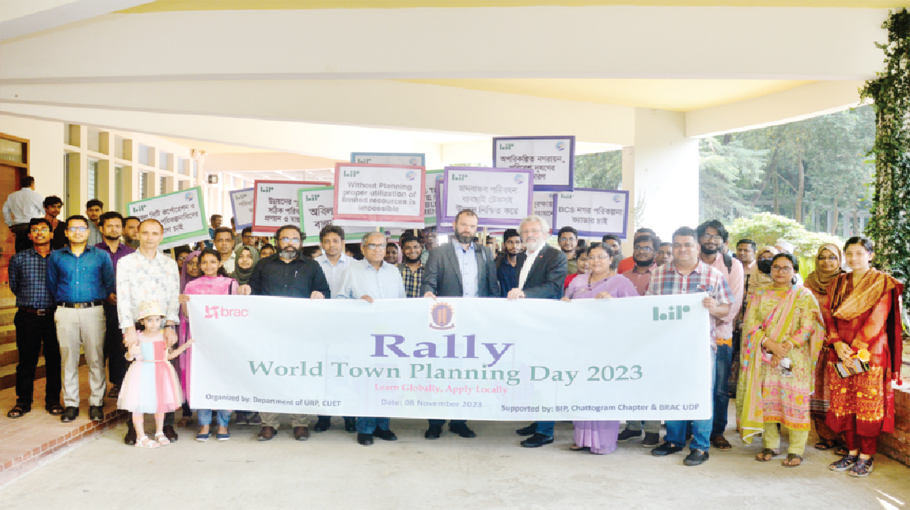World Town Planning Day observed

Urban and Regional Planning Department of Chittagong University of Engineering and Technology (CUET) in collaboration with Bangladesh Institute of Planners (BIP) and BRAC observed the World Town Planning Day-2023 on Wednesday.
This year's theme was “Learn Globally, Apply Locally” (Learn Globally, Apply Locally).
On this occasion, a colorful procession was brought from in front of the CUET Vice-Chancellor's office in morning. Teachers-students, officials-employees of different departments of the university participated in it.
A discussion was held in the academic council room of the administrative building on the occasion of 'World Urban Planning' day. CUET Vice Chancellor Professor Dr. Mohammad RafiqulAlam was the chief guest. Dean of Architecture and Planning Faculty Professor Dr. Muhammad Rashidul Hasan, Project Director of Chittagong Master Plan Project under Chittagong Development Authority (CDA) Muhammad Abu Isa Ansari, Senior Regional Coordinator of Urban Development Program managed by BRAC Abu Muzaffar Mahmud were special guests.
Debashish Roy Raja, Head of Department of Urban and Regional Planning, presided over the event. Dr.FauziaGulshana Rashid Lopa, Assistant Professor of Urban and Regional Planning Department, presented a paper on "Climate Change Issue" in the discussion meeting.
Sohag Ahmed, Monitoring and Evaluation Officer, BRAC Urban Development Program, presented another paper on improving the liveability of low-income people in the city. The program was moderated by Assistant Professor of Town and Regional Planning Department Tandra Das.
CUET VC Prof.Dr. Mohammad RafiqulAlam said, “There is no alternative to skills for the young generation to move forward. Development and connectivity have grown at an incredible pace in the last 14 years under the leadership of the Prime Minister. Urbanization is increasing rapidly in the country. At present about 35-40 percent people live in cities. But we have only two big cities. Our country has not yet been able to handle the pressure of such a large population. If most of the people in the country become urbanized like this, the cities will lose liveability. Agriculture will decrease, production will decrease, ecological balance will be affected. That is why the civic facilities of the city should be delivered to the rural areas as well. The Prime Minister's vision was that villages will become cities. Hence there is no alternative to adopting sustainable and smart planning. Not only should development be done, but that development should be made sustainable and environment friendly. In order to build a smart Bangladesh and a smart city, the citizens of the country also need to have smart thinking. We should come forward with cooperative attitude towards government plans and initiatives. Only then building Smart Bangladesh will be easy, Bangladesh will reach its desired goal.




